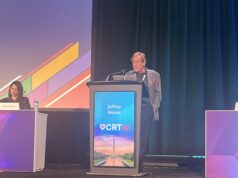The NIPPON (Nobori dual antiplatelet therapy as appropriate duration) study, presented in a hotline session at the ESC today, indicates that in patients undergoing percutaneous coronary intervention (PCI) with the Nobori stent, short-term duration (six months) of dual antiplatelet therapy is non-inferior to a longer course of DAPT (18 months). However, investigators Masato Nakamura (Toho University Ohashi Medical Center in Tokyo, Japan) and others report that this result needs to be interpreted with caution because the enrolment of the study was terminated prematurely.
In the multicentre, randomised study, patients undergoing PCI with a drug-eluting stent with a biodegradable polymer (Nobori, Terumo) were randomised to receive DAPT for six months or for 18 months. Nakamura commented: “A combination of short DAPT and a newer drug-eluting stent should be able to minimise the incidence of thrombotic events and bleeding complications simultaneously.” He noted that the primary endpoint was the rate of net adverse clinical and cerebrovascular events (NACCE).
The study enrolled 3,775 patients with coronary artery disease or acute myocardial infarction and incorporated broad inclusion criteria to reflect the real-world clinical setting. However, an interim analysis indicated a slow rate of enrolment and a substantially lower of events than expected; therefore, the study was terminated early.
Results for only the first 2,772 patients to be followed up (for at least 18 months) showed that there was no significant difference between groups in the rate of the primary outcome – confirming the non-inferiority of short-term therapy. Additionally, the rate of bleeding events was also similar (0.73% for long-term DAPT vs. 0.96% for short-term DAPT) as was the rate of stent thrombosis (0.07% in both).
Nakamura commented: “The results need to be interpreted with caution given the premature termination of enrolment, an open-label design with frequent crossover and a wide non-inferiority margin.”











